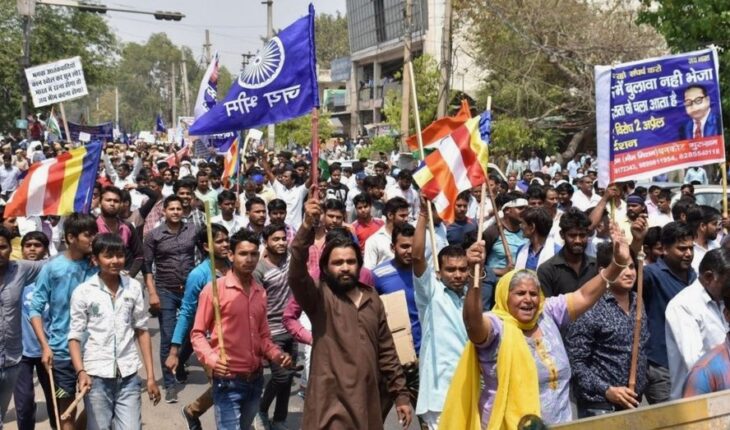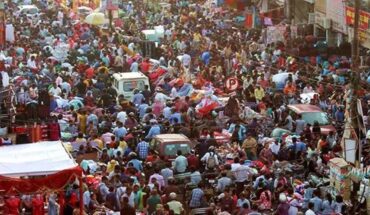The persistence of caste stigma against Dalits in India is a complex issue rooted in historical, social, economic, and political factors established through a very long journey categorised by the upper caste strata by some selfish groups to give self a rise and higher status with the ill intention to suppress the innocent people categorised as the Shudras by the so-called self-proclaimed custodians of the religion.
The caste system was weaved by these cunning groups in ancient Indian society, grouping these innocent people in the self-created untouchable category keeping them at the bottom and tied to occupations deemed impure. Despite legal abolition, these hierarchical notions linger in cultural practices and mindsets, reinforced over centuries.
Indian Constitution under the chapter ‘Fundamental Rights’ has guaranteed the citizens of India some fundamental rights which cannot be violated or snatched except directed by the law of the land and are enforceable in a court of law. However, this does not mean that they are absolute or immune from Constitutional amendment.
These rights also have been aimed at overturning the inequalities of pre-independence social practices. Specifically, they have also been used to abolish untouchability and hence prohibit discrimination on the grounds of religion, race, caste, sex, or place of birth.
But, did we succeed in abolishing the stigma of untouchability and discrimination on the grounds of religion, race, caste, sex, or place of birth? The answer is- only up to some extent.
Let us quote some instances, where the caste stigma still hinders the fundamental rights of the lower strata.
In village Mauli, under Panchkula district of Haryana, hundreds of policemen were deployed at a ‘Baraat’ (wedding procession) in the first week of this April, though it was neither due to the presence of any protected VVIP person in the event nor the groom was any gangster or most wanted person. The groom was just a member of Dalit caste and he came to Mauli with his Baraat to marry a Dalit girl of this village.
Now the questions pop up in mind – “Why so much police force had to cover the wedding procession? Who asked for the police? What was the bone of contention?”
Media Reports state that the family of the groom had to involve the police after some upper caste villagers having a strong majority in the village tried to stop the procession of the groom for being a Dalit.
Why was the wedding procession obstructed? The groom’s riding on the Ghora-Buggi (Horse Cart) was the main cause of discord. In India, at some places, the tradition of riding a horse or a horse cart, well-decorated for such special occasions, is considered a symbol of pride and dignity, but the villagers of upper caste strata who objected to the procession were not willing to accept this tradition being practised by a Dalit groom. They consider riding on horse in wedding procession as their monopoly and sole right and using this right by a person from a lower caste is an insult to them.
Another incident of insulting and obstructing a Dalit to perform some religious rituals that has drawn the attention of even National Media and also became an agenda of speech during All India Congress Committee (AICC) session on April 9, wherein Congress President Mallikarjun Kharge and former party president Rahul Gandhi both mentioned the most stigmatic incident of “washing” of a temple after a visit by Tika Ram Jully, the Congress Leader of the Opposition in Rajasthan assembly.
Addressing the congress workers, Gandhi said, “They don’t give rights to Dalits to enter temples, and when one goes, they clean the temple. This is not our religion… Our religion respects every individual. This thing – be it against Dalits or backwards – is hidden in the hearts of every BJP worker”, Indian Express reports the statement.
Why are the congress leaders alleging of the BJP for the incident? The Indian Express adds that the person, Gyandev Ahuja a former three-time MLA of BJP, who reportedly sprayed the Ganga Jal (Water of pious river Ganga) for purifying the temple after the visit of Dalit congress leader, Tika Ram Jully, had been associated throughout his political journey with BJP’s wings –RSS, Hindu Jagran Manch, Bhartiya Mazdoor Sangh and ABVP since his childhood.
What the issue was?
Dalit congress leader Tika Ram Jully, on the auspicious occasion of Ram Naumi, 6th April 2025, visited the temple to worship the lord Ram, but as alleged that after the visit of the Dalit leader BJP leader purified the temple by sprinkling Ganga Jal.
Congress@ INCIndia on April 7 reacted sharply against the act of the BJP leader and commented that the anti-Dalit face of BJP has come to the fore once again.
“Leader of Opposition in Rajasthan Assembly, Tika Ram Jully ji, comes from the Dalit community. He went to visit the Ram temple on Ram Navami. After this, former BJP MLA and Narendra Modi’s favourite, Gyandev Ahuja washed the Ram temple with Gangajal.”
INC further tweeted, “Ahuja says that Dalits are impure. Impure people had entered the temple, so we washed the Ram temple with Gangajal.”
INC alleged, “This is not the first case, BJP and RSS people have been continuously insulting Dalits. What Modi’s close aide Gyandev Ahuja has done is a living proof of BJP’s anti-Dalit mentality.”
The sufferer, Tika Ram Jully on April 7, explains the incident @TikaRamJullyINC, “The statement of senior BJP leader Shri Gyandev Ahuja is indicative of BJP’s mentality towards Dalits. I had raised the voice of Dalits in the assembly and talked about running a campaign against untouchability, but BJP’s mentality is that they are talking about washing the temple with Gangajal if I visit the temple because I am a Dalit. This is not only an attack on my personal faith but also a statement promoting the crime of untouchability.
Does BJP hate Dalits so much that it cannot even see us doing puja? Do only BJP leaders have the right over God?”
The Chief Minister and BJP State President should clarify whether they support the statement of washing the temple with Gangajal if Dalits visit the temple? asks Jully.
Month of March also ended with some unfortunate note, when some miscreants allegedly vandalized Veer Tejaji Maharaj’s statue at Jaipur, Rajasthan on March 29, which sparked outrage among locals, who took to the streets on Saturday, hampering the vehicular movement on the Tonk Road as a mark of dissent. Tejaji or Veer Tejaji is a Rajasthani folk deity. He is considered to be one of the eleven major incarnations of Shiva and is worshipped as a deity in the states of Rajasthan, Madhya Pradesh, Gujarat, Uttar Pradesh and Haryana by mostly the farmer community and other backward caste (OBC) people and any perceived disrespect to his legacy is seen as an insult to cultural sentiments.
These nefarious incidents clearly indicate the growing challenges faced by Dalit and other backward communities in India as social and cultural norms framed by the higher caste strata are often used to remind the Dalits their actual place in social fabric. And they always display a message, through all the platforms by doing some nuisance activities now and then – ‘Never Forget That You Are A Dalit’, so that the lower strata feeling fear of social and physical harassment can never rise their heads before these so-called dictatorial people or social groups belonging to the upper caste higher strata.
On one hand the so-called ‘Hindu Vadi’ forces growing abruptly in India claim that they are staunch supporter of ‘Vasudhaiva Kutumbakam’ (The world is one family) and on the other hand they even discriminate between Hindu and Hindu on caste and creed basis by insulting the lower strata. Are the lower strata people not the Hindus or are they Hindus only when the trumpet of elections starts sounding?
However, due to education, city-based jobs available to Dalits, Indian Constitution and Dalit movements, like those led by figures such as Dr. B.R. Ambedkar, have pushed for rights and visibility and have made some positive changes in the lives of Dalits, but the systemic change is slow and dismantling the centuries-old prejudices requires sustained effort across society. (Ground Post)
Jag Mohan Thaken is a Senior Journalist, Columnist & Political Analyst, views are personal






